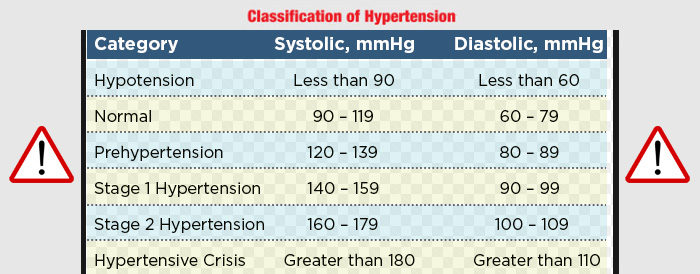
Hypertension Warning Signs
Could you have high blood pressure and not even know it?
What Is Hypertension?
Hypertension, or high blood pressure, is a common condition that will catch up with most people who live into older age. Blood pressure is the force of blood pressing against the walls of the arteries. When it’s too high, it raises the heart’s workload and can cause serious damage to the arteries. Over time, uncontrolled high blood pressure increases the risk of heart disease, stroke, and kidney disease.
Hypertension Symptoms
High blood pressure is sometimes called a silent killer because it may have no outward symptoms for years. In fact, one in five people with the condition don’t know they have it. Internally, it can quietly damage the heart, lungs, blood vessels, brain, and kidneys if left untreated. It’s a major risk factor for strokes and heart attacks in the U.S.
What Causes Hypertension?
Normal blood pressure readings will fall below 120/80, while higher results over time can indicate hypertension. In most cases, the underlying cause of hypertension is unknown. The top number (systolic) shows the pressure when the heart beats. The lower number (diastolic) measures pressure at rest between heartbeats, when the heart refills with blood. Occasionally, kidney or adrenal gland disease can lead to hypertension.
Pre-hypertension: A Warning Sign
Almost one-third of Americans have pre-hypertension. Their blood pressure is consistently just above the normal level — falling anywhere between 120 and 139 for systolic pressure or 80 to 89 for the diastolic pressure. People in this range have a higher risk of developing heart disease than those with a lower reading. Your doctor may recommend lifestyle changes to help lower your blood pressure.
The Hypertension Danger Zone
You have high blood pressure if readings average140/90 or higher — for either number — though you may still have no symptoms. At 180/110 and higher, you may be having a hypertensive crisis. Rest for a few minutes and take your blood pressure again. If it is still very high, call 911. A hypertensive crisis can lead to a stroke, heart attack, kidney damage, or loss of consciousness. Symptoms of a hypertensive crisis can include a severe headache, anxiety, nosebleeds, and feeling short of breath.
Who Gets High Blood Pressure?
Up to the age of 45, more men have high blood pressure than women. It becomes more common for both men and women as they age, and more women have hypertension by the time they reach 65. You have a greater risk if a close family member has high blood pressure or if you are diabetic. About 60% of people with diabetes have high blood pressure.
Hypertension and Race
African-Americans are more likely to develop hypertension — and to develop it at a younger age. Genetic research suggests that African-Americans seem to be more sensitive to salt. Diet and excessive weight can play a role, as well.
Hypertension and Sodium
Sodium, a major component of salt, can raise blood pressure by causing the body to retain fluid, which leads to a greater burden on the heart. The American Heart Association recommends eating less than 1,500 milligrams of sodium per day. You’ll need to check food labels and menus carefully. Processed foods makes up the majority of our sodium intake. Canned soups and lunch meats are prime suspects.
Hypertension and Stress
Stress can make one’s blood pressure spike, but there’s no evidence that it causes high blood pressure as an ongoing condition. However, stress may affect risk factors for heart disease, so it may have an indirect connection to hypertension. Stress may lead to other unhealthy habits, such as a poor diet, alcohol use, or smoking, which can contribute to high blood pressure and heart disease.
Hypertension and Weight
Being overweight places a strain on the heart and increases your risk of high blood pressure. That is why diets to lower blood pressure are often also designed to control calories. They typically call for cutting fatty foods and added sugars, while increasing fruits, vegetables, lean protein, and fiber. Even losing 10 pounds can make a difference.
Hypertension and Alcohol
Drinking too much alcohol can increase your blood pressure. Guidelines from the American Heart Association state that if you drink alcohol, you should limit the amount to no more than two drinks a day for men, or one a day for women. They define a drink as one 12-ounce beer, four ounces of wine, 1.5 ounces of 80-proof spirits, or one ounce of 100-proof spirits.
Hypertension and Caffeine
If caffeine can make you jittery, can it also raise your blood pressure? It might have a temporary effect, but studies haven’t shown any link between caffeine and the development of hypertension. You can safely drink one or two cups a day, according to the American Heart Association.
Hypertension and Pregnancy
Gestational hypertension is a kind of high blood pressure that occurs in the second half of pregnancy in women who have never experienced high blood pressure before. Without treatment, it may lead to a serious condition called preeclampsia that endangers both the mother and baby. The condition can limit blood and oxygen flow to the baby and can affect the mother’s kidneys and brain. After the baby is born, the mother’s blood pressure usually returns to its normal level.
Hypertension and Medicine
Cold and flu medicines that contain decongestants are one of several classes of medication that can cause blood pressure to rise. Others include NSAID pain relievers, steroids, diet pills, birth control pills, and some antidepressants. If you have high blood pressure, talk to you doctor about what drugs and supplements you are taking that may affect blood pressure.
For More: http://www.webmd.com/hypertension-high-blood-pressure/ss/slideshow-hypertension-overview

